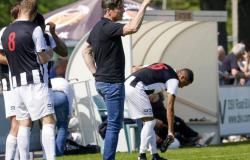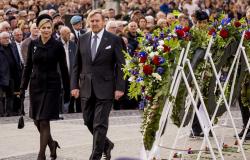In association with
RTV Drenthe
NOS News•yesterday, 8:48 PM
For the first time, there will be a major investigation into the problems faced by victims of the primary school hostage crisis in Bovensmilde in 1977. The then 11-year-old Cor Udding has fought for more recognition for the victims in recent years. “Finally a big step towards recognition, even though this should have happened 47 years ago,” he says to RTV Drenthe.
Four South Moluccan youths entered the De Meenthe primary school in Bovensmilde on May 23, 1977. 105 children and five teachers were held for days. After four days, the children and one teacher were released.
The other teachers were released on June 11, after the army was deployed and armored vehicles were sent to the school. That was the same day that marines put an end to a train hijacking at De Punt, not far from Bovensmilde.
Tanks on every corner
“It was not only the hostage situation that lasted for days that had a huge impact on the young children, but also the long aftermath,” says the now 58-year-old Udding. He remembers that it was unsafe in the village due to riots and arson.
There was also military security at the school and there were tanks on every corner for a year. “That all had such a huge impact. I think the period afterwards was just as dramatic as the hostage situation itself.”
He believes that there has been insufficient aftercare for the victims, went to politics several times and entered into discussions with Prime Minister Rutte. “Very unfairly, some victims were told by care providers that they were too young at the time to really do anything about it. And there was no discussion about it within families,” he says.
Burdened with memories
According to Udding, the events and the lack of aftercare have affected the lives of many victims. “I myself was not bothered by the trauma for quite a while, until my freedom was suddenly restricted during the corona period with the introduction of the curfew. I then started to suffer from memories of that time and I also started to dream about it.”
He decided to contact the other hostages. “There are many stories about divorces, social and societal problems, both mental and physical, within families and post-traumatic situations,” he says. He does not want to say how large the group is that has now reported to him. “But there are a lot of them and they keep coming.”
Gain trust
He considers the announced investigation “a first step towards rehabilitation”. The investigation was announced last week by Minister Weerwind (Legal Protection) and is part of a larger project on victims of the Ministry of Justice and Security. The study will start soon and will be conducted by ARQ National Psychotrauma Center.
“Let me put it this way: this is an important and good step and proof that we have not been forgotten. But I am also cautious, the cork has not yet come off the champagne bottle,” says Udding about the research.
“I am pleased with the word ‘careful’ in the text of Weerwind, because that is also extremely important. The conversations with the victims must form the basis, but before you talk about good conversations, you must first gain trust. That will become a challenge, after all those decades of nothing happening.”






